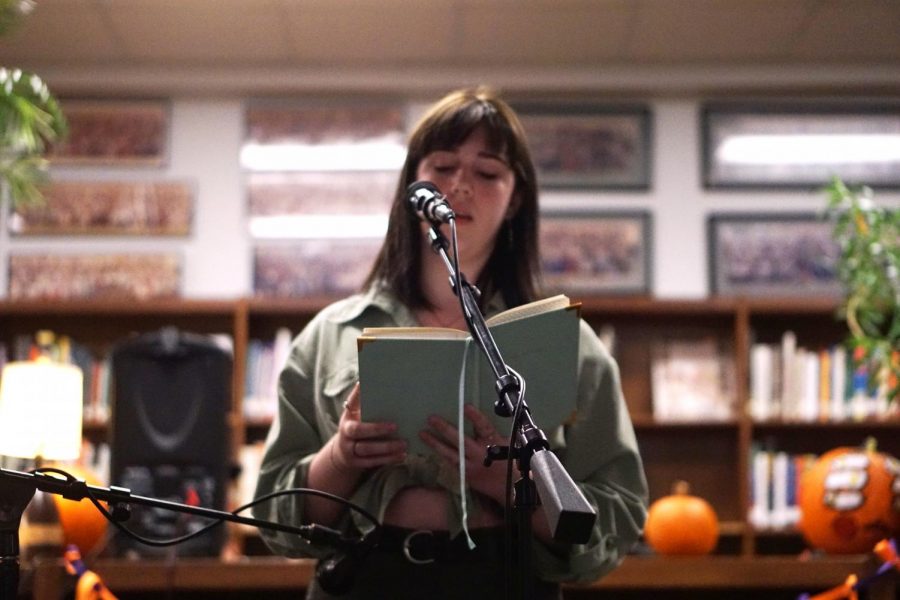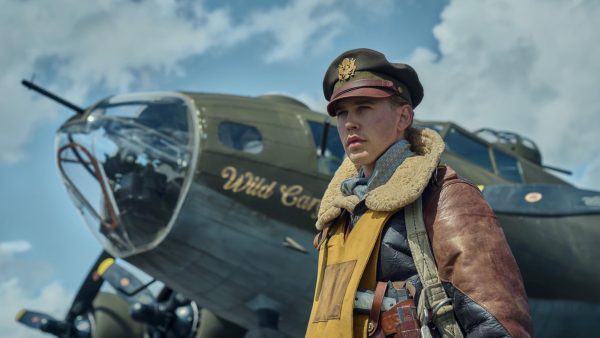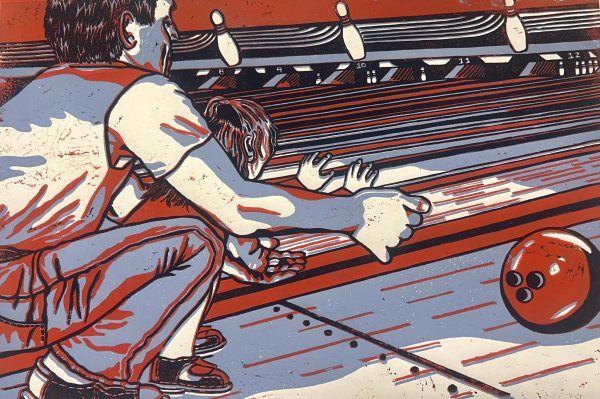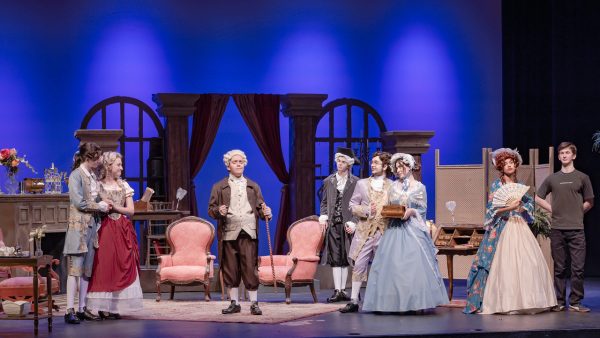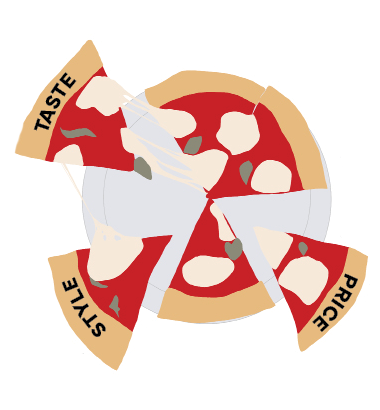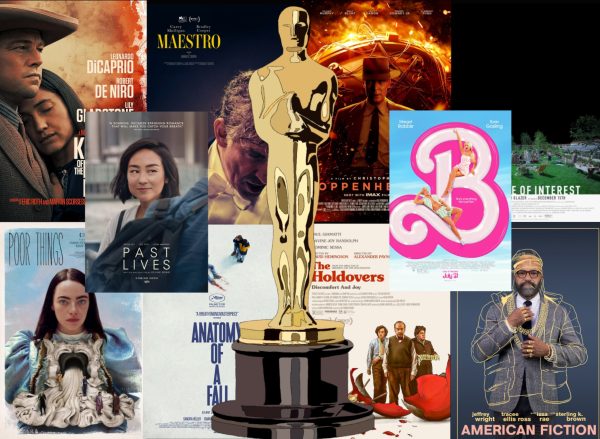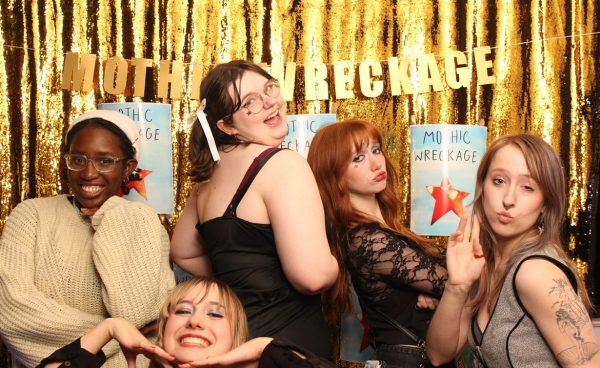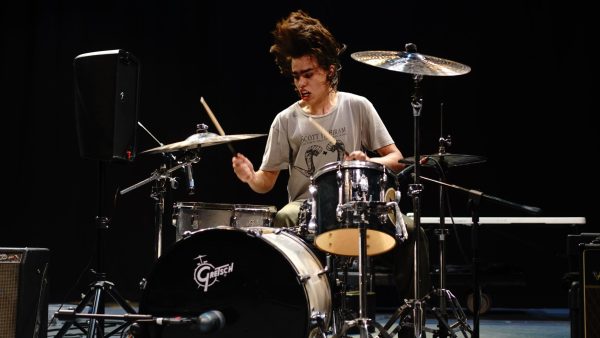Poetry in motion
For sophomore Ivy Jane Golyzniak, true beauty lies in evoking emotions
Ivy Jane Golyzniak performs her spoken word poetry at the annual Coffee House hosted by Excalibur. Photo by Ellen Fox.
February 13, 2020
The Shield: How does speaking your poetry out loud adds to the impact or experience listeners get?
Ivy Jane Golyzniak: I think it’s cool either way. If it’s being read by a person who didn’t write it, they can understand it and interpret it the way they want to so it has a different meaning. Sometimes they even find a different meaning from what the writer intended. On the other hand, if a writer is reading it out loud, you can hear the intonation and emphasis that the author wanted there to be in certain spots, which can change the meaning of the writing.
TS: Do all your poems have an intended meaning? Or are some a little bit more abstract?
IJG: I think a lot of mine do have an intended meaning. Like I said earlier though, they can change meanings depending on where the intonation is and who’s reading it. People can always interpret a poem differently.
TS: What qualities do you look for when you’re choosing which poems to speak out loud?
I find myself seeing more beauty in things. I think that’s because I’m looking for inspiration constantly.
— Ivy Jane Golyzniak
IJG: I really like the ones that have twists. Whenever I am reading poetry that has a twist at the end or has a different meaning than what I originally thought, it gives me this amazing reaction; it gives me chills down my spine because it’s so unexpected. I think when I’m choosing which of my poems I’m going to read out loud, I try and go for the ones that I think would give other people that same response.
TS: Considering the vulnerability of your poetry, do you ever get nervous performing in front of people?
IJG: All the time. Coffeehouse was my first performance of any of my written stuff. It was really nerve-wracking because not only did I have to get up in front of people, but I was doing it for the first time ever.
TS: What motivated you to bite the bullet?
IJG: Well, I had been thinking about it for a while. Since I’m in Excalibur, who organized the event, there were a lot of people saying things like, “Oh, you should read one of your things!” So I finally decided to just say, “You know what? Screw it. I’m scared. But I’m going to do it anyway.” The community of artists at this school is so welcoming and I immediately felt accepted.
TS: Let’s talk about the process and inspiration for your writing. Where do you draw a bulk of your inspiration from?
IJG: Mostly personal feelings that I just get. Whenever I’m feeling a strong emotion, I’ll write about it. I don’t always write a poem specifically talking about my experience. Instead, I will create a poem that creates the mood and atmosphere of how I’m feeling. So if I’m feeling sad, I’ll write a poem that, even if it’s not talking about me being actively being sad, will have a sad tone to it.
TS: Do you have a specific place where you write your poetry? Do your surroundings affect what you write?
IJG: I think I’m actually really lucky because I can get inspiration anywhere. This sort of sounds bad, but sometimes I’ll be drifting off in class, and I’ll just get one sentence in my head. I then I find myself writing an entire poem from that one sentence. I keep a journal in my backpack that I write in. I also have a poetry folder in the notes app on my iPhone that has over 300 poems in it.
TS: Any authors or songwriters that you look up to?
IJG: Rupi Kaur. Her writing is what ultimately inspired me to write my own poetry. The summer of freshman year I read The Sun and Her Flowers, her first book. I loved it so much. I was so jealous and wanted to write just like her. I started writing my own poetry because of that book. For Christmas, I asked for a ton of poetry books. I think I got around 10 poetry books that year. Those books really made me even more inspired to write.
TS: l’d love to discuss the visual element of some of your poems, like the collages you make. What do you think these collages add to your poetry?
IJG: I think the first time I did collages with my poetry was for an assignment in creative writing. We were making our own magazines and it’s very free- formed and unstructured, so we could create whatever we wanted. I wanted to make my poems look pretty. I was like, “OK, I’ll collage the edges and cover.” I was already into collages, but I wasn’t doing it as much as I’d like. So these collages turned into a way for me to keep doing collages while making my writing visually interesting as well.
I finally decided to just say, ‘You know what? Screw it. I’m scared. But I’m going to do it anyway.’
— Ivy Jane Golyzniak
TS: You said that when you’re reading your poetry out loud, the vocal element emphasizes the twists and turns of what you write. What do your collages add to your poetry?
IJG: I think it can emphasize a mood that’s already in the poem. For example, if you’re working with red colors or sharp, aggressive photos, it can translate to anger and can make the mood of the poem more clear.
TS: You said the other day that you’re dipping your feet into songwriting. How’s that going?
IJG: Well, I have one song. It’s really hard. I didn’t realize how difficult songwriting is when I was younger. I’m seeing all these people from our school that have bands and write such incredible songs and I’m so much more impressed because I now know just how difficult it is. It’s definitely a lot more difficult than writing poetry. Right now, it’s just me and my guitar, but I would love to have a band one day.
TS: How do you think that poetry and music are similar? Did one inspire a love for the other?
IJG: I’ve grown up with music and loved it throughout my life. I think from music stemmed a love for writing, then from writing stemmed a love for songwriting.
TS: Do poetry, music and songwriting all have an underlying theme or concept that attracts you?
IJG: Emotions, definitely. I’m inspired by emotions.
TS: Do you think your new passion for poetry has affected your everyday actions and your life in general?
IJG: Yes. I feel like this is also cheesy, but I find myself seeing more beauty in things. I think that’s because I’m looking for inspiration constantly. Like every second. You never know when inspiration is going to come and where it’s going to come from, so I try to pay attention to everything, just in case.
TS: Is there anything you’d say to budding songwriters or poets too nervous to share their work?
IJG: Share it anyway. You sharing your art could improve someone’s life. Always remember that.
You can hear Ivy perform her poetry Thursday at the spring Coffee House during eighth period in the library.



